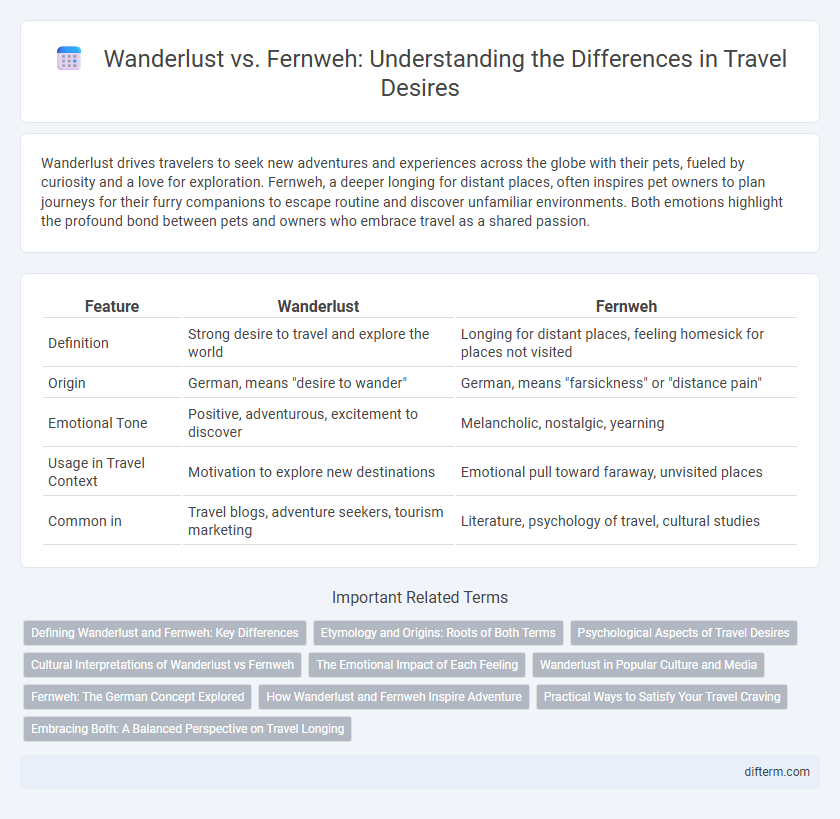Wanderlust drives travelers to seek new adventures and experiences across the globe with their pets, fueled by curiosity and a love for exploration. Fernweh, a deeper longing for distant places, often inspires pet owners to plan journeys for their furry companions to escape routine and discover unfamiliar environments. Both emotions highlight the profound bond between pets and owners who embrace travel as a shared passion.
Table of Comparison
| Feature | Wanderlust | Fernweh |
|---|---|---|
| Definition | Strong desire to travel and explore the world | Longing for distant places, feeling homesick for places not visited |
| Origin | German, means "desire to wander" | German, means "farsickness" or "distance pain" |
| Emotional Tone | Positive, adventurous, excitement to discover | Melancholic, nostalgic, yearning |
| Usage in Travel Context | Motivation to explore new destinations | Emotional pull toward faraway, unvisited places |
| Common in | Travel blogs, adventure seekers, tourism marketing | Literature, psychology of travel, cultural studies |
Defining Wanderlust and Fernweh: Key Differences
Wanderlust is an intense desire to explore and experience new places, driven by curiosity and the joy of travel itself. Fernweh, a German term, refers to a deep, often nostalgic longing for distant locations and unfamiliar landscapes that one has never visited. The key difference lies in wanderlust's active pursuit of travel contrasted with fernweh's emotional yearning for faraway places.
Etymology and Origins: Roots of Both Terms
Wanderlust originates from the German words "wandern," meaning to hike or roam, and "Lust," meaning desire or pleasure, reflecting a deep craving for physical travel and exploration. Fernweh also stems from German, combining "fern," meaning far, and "Weh," meaning pain or ache, symbolizing a longing or ache for distant places beyond immediate reach. Both terms encapsulate distinct emotional drives for travel, with wanderlust emphasizing active adventure and fernweh conveying a poignant yearning for faraway destinations.
Psychological Aspects of Travel Desires
Wanderlust manifests as a deep, innate craving for exploration driven by curiosity and the pursuit of novel experiences, often linked to openness and personality traits promoting adventure. Fernweh, a German term translating to "distance pain," reflects a psychological longing for distant places, embodying a sense of homesickness for places never visited and a desire to escape routine. Both concepts highlight complex emotional and cognitive processes underpinning travel desires, involving dopamine-driven reward mechanisms and the human need for self-discovery and emotional renewal.
Cultural Interpretations of Wanderlust vs Fernweh
Wanderlust, rooted in German and widespread in global discourse, signifies a profound desire to explore new cultures and immerse oneself in diverse experiences, emphasizing personal growth through travel. Fernweh, a German term meaning "distance pain," conveys a deeper, often nostalgic longing to visit faraway places, reflecting emotional and psychological ties to distant destinations rather than mere curiosity. Cultural interpretations position wanderlust as an active pursuit of adventure, while fernweh captures a more introspective, yearning sentiment for connectedness with the unknown.
The Emotional Impact of Each Feeling
Wanderlust ignites a passionate desire to explore new destinations, fostering excitement and anticipation that enrich emotional well-being. Fernweh, a deep yearning for distant places, often evokes a bittersweet blend of nostalgia and hope, reflecting a more profound emotional complexity. Both feelings drive travelers to seek meaningful experiences, shaping personal growth and emotional fulfillment through the journey.
Wanderlust in Popular Culture and Media
Wanderlust in popular culture and media is frequently depicted as a deep, irresistible passion for exploring new destinations, symbolizing freedom and self-discovery. Films, literature, and social media amplify this craving by showcasing vivid travel experiences and inspiring narratives that resonate with global audiences. The term's widespread use reflects society's growing value on adventure and cultural immersion as essential aspects of modern identity.
Fernweh: The German Concept Explored
Fernweh, a German term meaning "far-sickness," describes a profound longing to explore distant places beyond one's familiar environment, often viewed as an intense desire for adventure and cultural immersion. Unlike wanderlust, which broadly signifies a general love for travel, fernweh captures the emotional ache and restless yearning specifically tied to being far from home. This concept emphasizes both the psychological and emotional dimensions of travel motivations, highlighting how the curiosity for the unknown drives travelers to seek new experiences worldwide.
How Wanderlust and Fernweh Inspire Adventure
Wanderlust ignites a deep desire to explore new destinations and experience diverse cultures, fueling a passion for travel and discovery. Fernweh, a German term meaning "far-sickness," drives an emotional longing to be far from home, pushing individuals toward distant and unfamiliar places. Together, these powerful feelings inspire bold adventures and enrich global exploration by motivating travelers to seek unique and transformative journeys.
Practical Ways to Satisfy Your Travel Craving
Wanderlust drives the desire to explore new destinations, while fernweh reflects a deep longing for faraway places yet to be visited, both fueling travel cravings in unique ways. Practical ways to satisfy these urges include planning weekend getaways, exploring local cultural sites, or engaging in virtual tours to experience global landmarks remotely. Creating a travel bucket list and joining travel communities can further nurture your passion for discovery and keep your wanderlust and fernweh alive.
Embracing Both: A Balanced Perspective on Travel Longing
Wanderlust reflects a deep desire to explore new places and experience diverse cultures, while fernweh captures a nostalgic yearning for distant, often unexplored destinations. Embracing both sentiments cultivates a balanced approach to travel longing, blending the excitement of future adventures with a meaningful connection to places imagined or remembered. This duality enriches the travel experience, fostering personal growth and a profound appreciation for global diversity.
wanderlust vs fernweh Infographic

 difterm.com
difterm.com